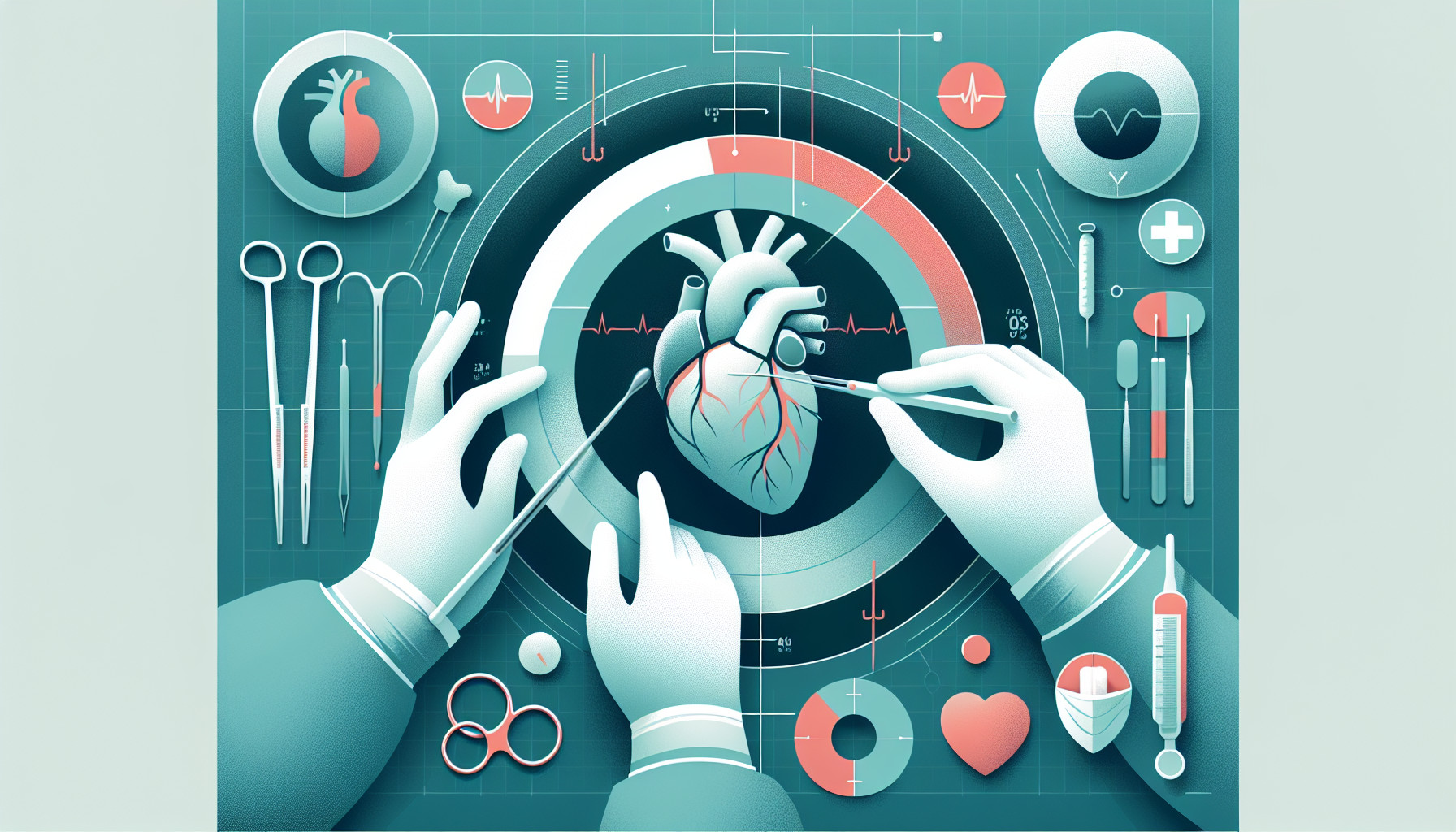Our Summary
This study looked at the timing of a procedure called catheter ablation in patients with a heart condition known as ventricular tachycardia. The procedure is used to correct abnormal heart rhythms. The researchers wanted to see if doing the procedure immediately after the first shock from an implanted defibrillator device (ICD) would have better outcomes than waiting and continuing with regular treatment.
The study was carried out in two phases with patients who had a type of heart disease and had an ICD implanted for prevention purposes. In the first phase, they watched the patients until they received their first shock from the ICD. Then, in the second phase, they divided the patients into two groups: one group had the ablation procedure immediately (within two months of the shock), and the other group continued with their usual treatment.
The researchers found that patients who had the ablation procedure right away had a lower risk of either dying or being hospitalized for worsening heart failure. They also had fewer shocks from their ICDs. This suggests that performing the ablation procedure immediately after the first ICD shock could be beneficial for patients with ventricular tachycardia.
FAQs
- What is the purpose of the catheter ablation procedure in patients with ventricular tachycardia?
- What was the purpose of the study regarding the timing of catheter ablation?
- What were the results of the study and what do they suggest for the treatment of patients with ventricular tachycardia who have received their first ICD shock?
Doctor’s Tip
One helpful tip a doctor might give a patient about cardiac ablation is to discuss the potential benefits of having the procedure done promptly after experiencing symptoms or receiving treatment such as a shock from an ICD. This study suggests that early intervention with ablation may lead to better outcomes and reduce the risk of complications. It’s important to have an open and honest conversation with your healthcare provider about the timing of the procedure and how it could benefit your specific situation.
Suitable For
Patients who are typically recommended cardiac ablation are those who have abnormal heart rhythms such as atrial fibrillation, ventricular tachycardia, or supraventricular tachycardia. These patients may have symptoms such as palpitations, dizziness, fainting, or shortness of breath, and may have not responded well to other treatments such as medications. Additionally, patients who have structural heart disease or a history of heart attacks may also be recommended for cardiac ablation to correct their abnormal heart rhythms.
Timeline
Before cardiac ablation:
- Patient is diagnosed with a heart condition, such as ventricular tachycardia
- Patient undergoes tests and evaluations to determine the best treatment plan
- Patient may receive medication or other treatments to manage their condition
- Patient may have an implanted defibrillator device (ICD) to monitor and treat abnormal heart rhythms
After cardiac ablation:
- Patient undergoes catheter ablation procedure to correct abnormal heart rhythms
- In the study mentioned, patients who had the ablation procedure immediately after their first ICD shock had better outcomes
- Patients may experience a lower risk of death or hospitalization for worsening heart failure
- Patients may have fewer shocks from their ICDs
- Patients may need follow-up appointments to monitor their condition and adjust their treatment plan if necessary.
What to Ask Your Doctor
- What is cardiac ablation and how does it work to correct abnormal heart rhythms?
- Am I a candidate for cardiac ablation? What factors make me a good candidate for this procedure?
- What are the potential risks and complications associated with cardiac ablation?
- What is the success rate of cardiac ablation in treating ventricular tachycardia?
- How long is the recovery period after cardiac ablation? Will I need to stay in the hospital?
- What are the alternative treatment options for ventricular tachycardia if I choose not to have cardiac ablation?
- How many cardiac ablation procedures have you performed for ventricular tachycardia? What is your success rate?
- How long do the effects of cardiac ablation typically last? Will I need additional procedures in the future?
- Are there any lifestyle changes or medications I will need to take after undergoing cardiac ablation?
- What symptoms should I watch out for after the procedure, and when should I contact you if I experience any concerns?
Reference
Authors: Della Bella P, Baratto F, Vergara P, Bertocchi P, Santamaria M, Notarstefano P, Calò L, Orsida D, Tomasi L, Piacenti M, Sangiorgio S, Pentimalli F, Pruvot E, De Sousa J, Sacher F, Tritto M, Rebellato L, Deneke T, Romano SA, Nesti M, Gargaro A, Giacopelli D, Peretto G, Radinovic A. Journal: Circulation. 2022 Jun 21;145(25):1829-1838. doi: 10.1161/CIRCULATIONAHA.122.059598. Epub 2022 Apr 3. PMID: 35369700
